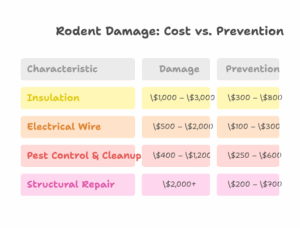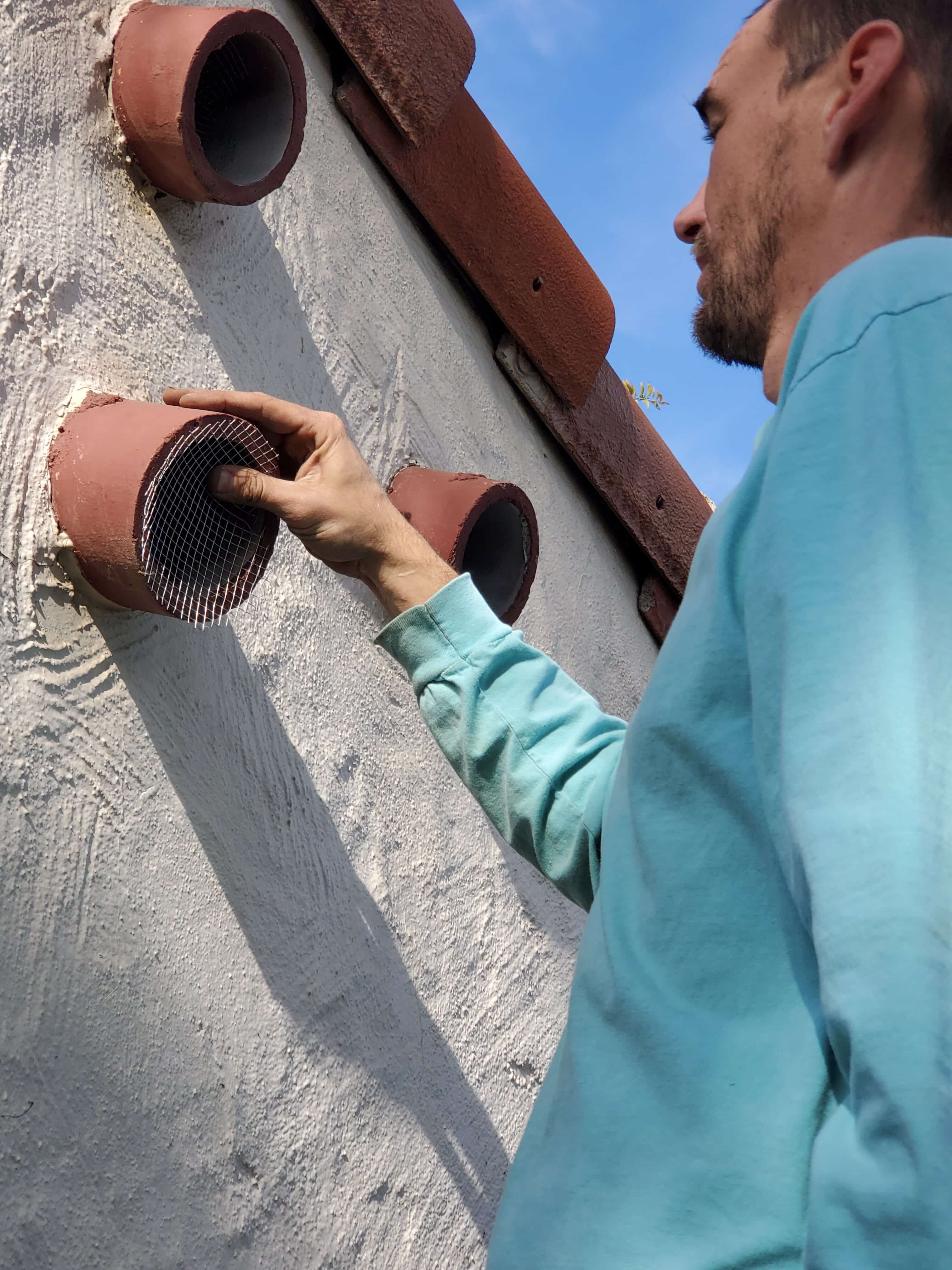Key Takeaways
- Keeping rodents out of your attic helps protect you from fires, diseases, and costly damage to your insulation or structure.
- Mice and rats breed quickly; one mouse today can lead to hundreds in a few months.
- Rodents damage insulation and air ducts, making the air inside less clean and increasing the cost of heating and cooling.
- Using metal to seal off entry points and cutting back tree branches will keep rodents out for good.
- It’s safer and cheaper to hire a professional to rodent-proof your attic than to do it yourself.
Rodents love your attic, and if you don’t make it rodent-proof, you’re inviting trouble. Let’s examine why you need to act immediately.
Did you know? The Centers for Disease Control and Prevention (CDC) reports that rodents can transmit many diseases through their urine, feces, and bites. If these pests enter your attic, they can harm your family’s health, compromise your insulation, and even damage your electrical system. That’s why rodent-proofing attic spaces is essential.
This guide will provide you with 10 strong reasons to keep rodents out of your attic, along with some expert tips to help you achieve this goal. So, read to the end!
Top Benefits of Attic Rodent-Proofing
1. Protect Your Insulation from Destruction
Rodent-proofing the attic prevents mice and rats from nesting in the insulation. Damaged insulation doesn’t work as well, which makes energy bills go up.
- Rodents eat fiberglass..
- Nesting materials block airflow
- Fixing insulation can be expensive.
Tip: Use steel mesh and expanding foam to fill in the gaps and keep them out.
2. Prevent Fire Hazards from Chewed Wires
Rodents chew electrical wires to stop their teeth from growing too long. This leads to fires and shorts.
- Attics are where 25% of unknown house fires start.
- Broken wires can cause fires and electrical problems.
- After you notice any signs of rodents, schedule regular inspections.
3. Stop Diseases from Entering Your Home
Hantavirus, leptospirosis, salmonella, and other diseases can be spread by rodents.
- Droppings make the air and surfaces dirty.
- HVAC systems spread disease.
- Kids and pets are especially at risk.
Put on a mask and gloves before going into your attic.
4. Avoid Expensive Structural Repairs
Wood, pipes, and ductwork that get chewed up require extensive repairs.
- Damage to the structure makes the roof less stable.
- Chewed pipes lead to water leaks.
- HVAC ducts are clogged with debris.
Look for droppings and gnaw marks on beams and corners.
5. Eliminate Foul Odors
Nests and droppings from rodents have a horrible smell. The smell of dead rodents is even worse.
- The smell from the attic gets into the bedrooms and vents.
- Without thorough cleaning, it can take weeks to eliminate odors.
Place one-way exclusion traps so that rodents can exit but not re-enter.
6. Prevent Nesting and Breeding
Mice and rats breed all year long, but they like to do it in warm, dark places like attics.
- One pair can have more than 200 babies in a few months.
- Infestations happen without a sound.
Rodent proofing in the attic can prevent nesting and breeding. Act now. One rodent today means dozens soon.
7. Maintain Your Property Value
Buyers don’t want to buy a house with an attic full of droppings, wires, and broken insulation.
- Home inspectors look for signs of rodents
- It costs more to fix things than to stop them from breaking.
A clean and safe attic can increase the value of a house when it’s sold.
8. Improve Indoor Air Quality
The air that enters your home from the attic is contaminated due to rodent droppings and dander.
- Allergies and asthma get worse.
- Air that is bad for the attic spreads through ducts.
After sealing your attic, using a HEPA vacuum is a great idea.
9. Lower Energy Bills
Rodent control in the attic helps the insulation work more effectively.
- Sealed attics keep cool and warm air inside.
- Less energy loss means lower bills.
Ensure that all soffits, vents, and gaps in the walls are completely sealed.
10. Peace of Mind
It feels good to know that there are no rodents in your attic.
- No sounds of scratching
- No worries about getting sick
- No extra costs
Rodent-proofing makes your home safe and comfortable for a long time.
Rodent-Proofing Tips from the Pros
Attic rodent proofing doesn’t have to be hard to keep rodents out of your attic. This is how professionals do it:
Look for Ways to Get In
Check vents, pipes, and cracks with a flashlight. A hole only ¼ inch wide is enough for mice.
Use metal flashing and steel wool
Rodents can’t eat through metal. Put it in holes and corners.
Put in door sweeps and screen vents.
Ensure the roof vents and attic hatches are securely closed. Don’t leave them open or broken.
Trim Tree Branches
Rodents use trees to jump into attics. Make sure branches are at least 6 feet away from the roof.
Don’t put food or trash near
Rodents can detect food from a considerable distance. Pick up the trash in your garage, attic, and yard.
Table: Rodent Damage vs Prevention Cost

These are average costs and can vary.
Prevention is often the most cost-effective, cleanest, and safest approach.
Don’t Wait Until It’s Too Late, Act Now!
Rodents never stop moving, and your attic is their favorite place to go. You shouldn’t put off rodent-proofing your attic spaces, as it’s not a DIY task. You need professionals who have the right tools and know how to use them.
That’s where My Insulation Guy comes in. Our team knows how to eliminate mice and rats in the attic effectively and offers reliable, affordable services. They can assist you with everything from rodent-proofing your attic to a complete restoration.
Don’t let your rodent ruin your comfort. Visit our website or contact us to help you secure your attic today.
FAQs
- When is the best time of year to keep mice out of the attic?
The best time is late summer or early fall. As the weather gets colder, rodents look for warmth.
- How can I tell if there are mice in my attic?
Check for chewed wires or insulation, droppings, and scratching.
- Is it a one-time job to keep rodents out of the attic?
It all depends. Sealing gaps is usually a one-time thing, but checking them regularly helps keep them safe for a long time.
- Is it possible for me to make an attic rodent-proof on my own?
You can try some simple steps, but professionals will make sure you are fully protected for a long time.
- Does insurance cover damage caused by rodents in the attic?
Most policies don’t cover damage caused by rodents over time. To avoid costs, you need to stop them from happening.

